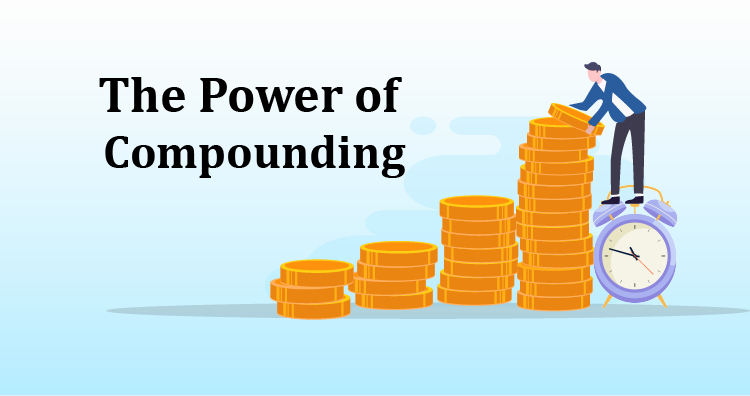- +91 9993073000
-



The Power of Compounding: How SIPs Can Turbocharge Your Mutual Fund Returns
When it comes to building long-term wealth, few strategies are as powerful as the combination of compounding returns and disciplined investing through Systematic Investment Plans (SIPs). This potent duo can unlock remarkable growth potential for your mutual fund investments, turning even modest contributions into a substantial corpus over time.
Understanding Compounding- Compounding is often called the "eighth wonder of the world" in investment. An asset can generate earnings, which are then reinvested to generate their earnings. This cycle continues, allowing your wealth to grow exponentially over time. The longer you remain invested, the greater the impact of compounding.
For example, if you invest ₹10,000 considering an assumed rate of 10% CAGR, your investment will grow to ₹11,000 in the first year. In the second year, the 10% return will be calculated on the new balance of ₹11,000, resulting in earnings of ₹1,100, and so on. This seemingly small difference can have a profound impact on your long-term wealth creation.
(* For illustration purposes only. The rate of return has been assumed to be 10% CAGR)
The Power of Systematic Investment Plans: SIPs are a disciplined investment approach that allows you to invest a fixed amount at regular intervals, typically monthly or quarterly. This strategy helps you leverage the power of rupee-cost averaging, which means you buy more units when prices are low and fewer units when prices are high, effectively averaging out the cost of your investments over time.
By combining SIPs with the compounding effect, you can unlock a powerful wealth-building strategy. Here's how it works:
The Compounding Advantage:
An illustrative example to understand the power of compounding with SIPs, consider the following scenario:
Suppose you start a SIP of ₹5,000 per month in an equity mutual fund. After 20 years, your total investment would be ₹12 lakh (₹5,000 x 12 months x 20 years). However, thanks to the compounding effect, your corpus would have grown to an impressive ₹45.99 lakh, assuming a 12% CAGR.
(*Calculation is only for illustrative purposes.)
Now, if you had increased your SIP amount by just ₹500 every year, your total investment over 20 years would be ₹23.40 lakh, but the compounded value would be a staggering ₹73.68 lakh – a significant difference resulting from the power of compounding and disciplined investing.
(*For illustration purposes only. The rate of return has been assumed to be 12% CAGR.)
While the example above is hypothetical, it highlights the remarkable potential of compounding when combined with the discipline of SIPs and adding stepup every year. By starting early and staying invested for the long term, you can harness the power of compounding to create substantial wealth and achieve your financial goals.
Remember, compounding and SIPs are not get-rich-quick schemes; they require patience, discipline, and a long-term commitment. However, for those willing to stay the course, the rewards can be truly transformative. Embrace the power of compounding with SIPs and set yourself on the path to financial freedom.
This blog is purely for educational purposes and not to be treated as personal advice. Mutual Fund investments are subject to market risks, read all scheme related documents carefully.
1192, Jaiswal Bhawan,
Home Science college Road
Napier Town,
Jabalpur (M.P.) 482001
www.viratfinserv.com
wecare@viratfinserv.com
anurag@viratfinserv.com

Mutual Fund Distributor
ARN No. 91159
ARN No. 263462
+91 9993073000

NSE NMF|| Registered Distributor
No.MFS91159
No.MFS263462
Risk Factors – Investments in Mutual Funds are subject to Market Risks. Read all scheme related documents carefully before investing. Mutual Fund Schemes do not assure or guarantee any returns. Past performances of any Mutual Fund Scheme may or may not be sustained in future. There is no guarantee that the investment objective of any suggested scheme shall be achieved. All existing and prospective investors are advised to check and evaluate the Exit loads and other cost structure (TER) applicable at the time of making the investment before finalizing on any investment decision for Mutual Funds schemes. We deal in Regular Plans only for Mutual Fund Schemes and earn a Trailing Commission on client investments. Disclosure For Commission earnings is made to clients at the time of investments.
AMFI Registered Mutual Fund Distributor – ARN-91159 | Date of initial registration – 13-Aug-2013 | Current validity of ARN – 12-Aug-2028
Important Links | Disclaimer | Disclosure | Privacy Policy | SID/SAI/KIM | Code of Conduct | SEBI Circulars | AMFI Risk Factors